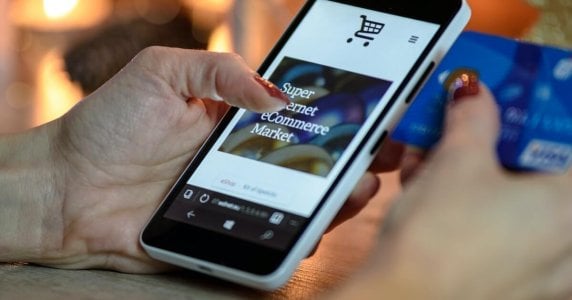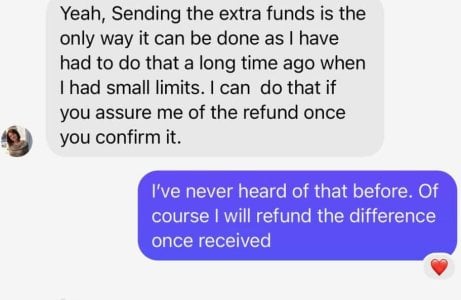Shocking data reveals the true cost of Facebook Marketplace scams - learn how to avoid becoming the next victim!
- Replies 17
Here at the Seniors Discount Club, we strive to keep our members informed about the latest news and practical advice, especially when it comes to navigating the ever-changing world of technology.
Today, we want to share an important and alarming story concerning a rising number of online marketplace scams.
A new trend called ‘quick fire’ scams are taking hold of online marketplaces, with fraudsters using crafty tactics to take advantage of unsuspecting buyers and sellers on online platforms.
The true cost of these scams has recently been revealed by startling data, and learning how to avoid becoming the next victim is crucial.
One such instance involved a Sydney mum named Paige Hinson. Paige had innocently listed her garden furniture on Facebook Marketplace after her young family moved to a new home. Within a few minutes, a seemingly interested buyer, using the name ‘Rosi’, contacted her.
Little did Paige know that she was being pushed straight into a trap.
Paige explained: ‘They were quite pushy and wanted to come and pick up the furniture the next day, which I was quite excited about because it was a $700 sale, and my husband said that was way too expensive.’
Rosi, claiming to be a middle-aged woman, first instructed Paige to transfer $500 into a PayPal business account for the purpose of verifying legitimacy. Paige, though a little unsure, gave her email address, thinking, ‘You can't possibly get scammed with just an email address.’
She then received a seemingly official email from PayPal. It was only at the last minute, after providing proof of her PayPal account and almost transferring the money, that Paige had a ‘gut feeling’ something was wrong.
She called her bank, which confirmed her suspicions.
‘I was essentially about to hit transfer, so I was quite lucky. I think the trick was it was so intense and quick, you don’t have time to think,’ Paige explained.
This worrying example highlights how quickly fraudsters can act and how convincingly they can deceive. Paige's experience shows that even well-intentioned, decent individuals can get caught up in these complex schemes.
And many of the victims, including Paige, never report to authorities.
According to the Australian Competition and Consumer Commission (ACCC), Australians lost more than $3 billion to scammers in 2022.
However, new data commissioned by start-up Sell Securely has shown that the true hidden cost of scams is much higher – around $9.3 billion.
The national survey discovered that over 52 per cent of Australians have been scammed, some multiple times. Alarmingly, 66 per cent of those victims have never reported it, which means around 6.7 million Australians are going without compensation or support after being scammed.
Rob Neely, Sell Securely Founder and Director, noted that an increasing number of these scams occur on social media, particularly on Facebook and its Marketplace feature.
Almost 45 per cent of Australians were scammed on social messaging and marketplaces.
Neely explained the ‘quick fire’ scam: ‘And because you can only directly contact the seller, not comment, they can shoot rapid-fire messages to multiple people 20, 30 times a day.’
Most scams are under $100, so victims often don't report them, but this leaves scammers to continue fooling innocent people, Neely added.
So, how can you protect yourself from falling prey to these scams? Neely advises:
Raising awareness and increasing vigilance are key to preventing these scams from affecting more innocent individuals.
 Stay safe in your online buying and selling endeavours, and keep sharing important information like this with your family and friends!
Stay safe in your online buying and selling endeavours, and keep sharing important information like this with your family and friends!
Today, we want to share an important and alarming story concerning a rising number of online marketplace scams.
A new trend called ‘quick fire’ scams are taking hold of online marketplaces, with fraudsters using crafty tactics to take advantage of unsuspecting buyers and sellers on online platforms.
The true cost of these scams has recently been revealed by startling data, and learning how to avoid becoming the next victim is crucial.
One such instance involved a Sydney mum named Paige Hinson. Paige had innocently listed her garden furniture on Facebook Marketplace after her young family moved to a new home. Within a few minutes, a seemingly interested buyer, using the name ‘Rosi’, contacted her.
Little did Paige know that she was being pushed straight into a trap.
Paige explained: ‘They were quite pushy and wanted to come and pick up the furniture the next day, which I was quite excited about because it was a $700 sale, and my husband said that was way too expensive.’
Rosi, claiming to be a middle-aged woman, first instructed Paige to transfer $500 into a PayPal business account for the purpose of verifying legitimacy. Paige, though a little unsure, gave her email address, thinking, ‘You can't possibly get scammed with just an email address.’
She then received a seemingly official email from PayPal. It was only at the last minute, after providing proof of her PayPal account and almost transferring the money, that Paige had a ‘gut feeling’ something was wrong.
She called her bank, which confirmed her suspicions.
‘I was essentially about to hit transfer, so I was quite lucky. I think the trick was it was so intense and quick, you don’t have time to think,’ Paige explained.
This worrying example highlights how quickly fraudsters can act and how convincingly they can deceive. Paige's experience shows that even well-intentioned, decent individuals can get caught up in these complex schemes.
And many of the victims, including Paige, never report to authorities.
According to the Australian Competition and Consumer Commission (ACCC), Australians lost more than $3 billion to scammers in 2022.
However, new data commissioned by start-up Sell Securely has shown that the true hidden cost of scams is much higher – around $9.3 billion.
The national survey discovered that over 52 per cent of Australians have been scammed, some multiple times. Alarmingly, 66 per cent of those victims have never reported it, which means around 6.7 million Australians are going without compensation or support after being scammed.
Rob Neely, Sell Securely Founder and Director, noted that an increasing number of these scams occur on social media, particularly on Facebook and its Marketplace feature.
Almost 45 per cent of Australians were scammed on social messaging and marketplaces.
Neely explained the ‘quick fire’ scam: ‘And because you can only directly contact the seller, not comment, they can shoot rapid-fire messages to multiple people 20, 30 times a day.’
Most scams are under $100, so victims often don't report them, but this leaves scammers to continue fooling innocent people, Neely added.
So, how can you protect yourself from falling prey to these scams? Neely advises:
- Use secure platforms that hold transactions in escrow until both parties are satisfied.
- If a deal seems too good to be true, it probably is. Be cautious, and don't feel pressured to send deposits quickly.
- Verify the person’s identity by asking for identification and making sure their account is legitimate.
- Lastly, if you do find yourself caught in a scam, Neely implores you to report it – especially to the ACCC, no matter how small the loss might be.
Raising awareness and increasing vigilance are key to preventing these scams from affecting more innocent individuals.
Key Takeaways
- A new 'quick fire' scam is targeting users on Facebook Marketplace, with fraudsters posing as buyers to trap unsuspecting sellers.
- The true cost of scams in Australia is estimated at around $9.3 billion, according to a national survey by start-up Sell Securely.
- Around 45 per cent of Australians have been scammed on social messaging and marketplaces, with many not reporting their experiences to authorities.
- To prevent scams, users are advised to verify the identity of potential buyers, avoid sending deposits, and report any scams to the Australian Competition and Consumer Commission.









